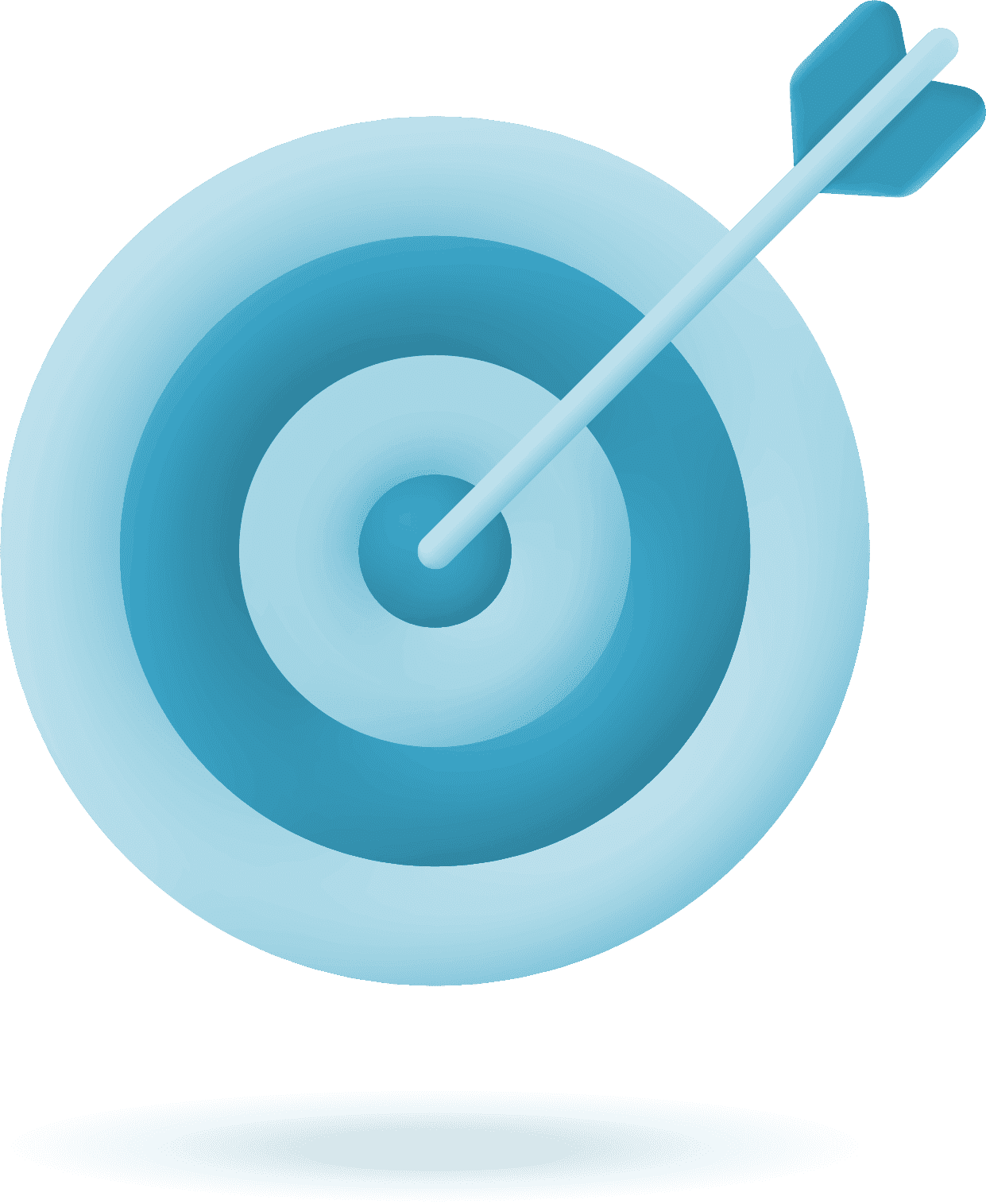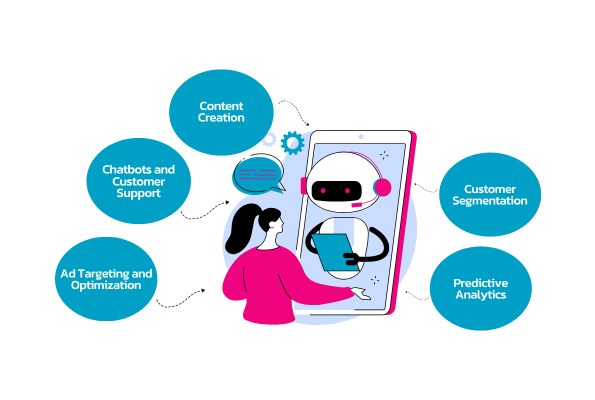
Imagine walking into your favorite store, and the salesperson already knows exactly what you’re looking for. They guide you right to it, suggest a few things you might also like, and even remind you of something you almost forgot to pick up. Feels pretty great, right? Well, that’s what AI does for digital marketing.
When we talk about AI in digital marketing, we’re talking about smart tech that helps brands understand and interact with customers better than ever. Think of it as the brainpower behind those personalized Netflix recommendations, or the reason why ads for things you’ve been eyeing seem to follow you around the internet. AI digs through heaps of data—your likes, clicks, and browsing habits—to figure out what you want and when you want it.
But it’s not just about being creepy accurate (though that’s definitely part of it!). AI makes everything faster and more efficient. Instead of spending hours crunching numbers or trying to guess what your audience might want, AI does the heavy lifting. It helps marketers like us understand trends, predict customer behavior, and even create content that resonates. In short, AI is the ultimate marketing sidekick, always on, always learning, and always ready to make your marketing strategy smarter.
Making AI Work for You in Digital Marketing
AI is more than just a buzzword—it’s a powerful tool that can change your marketing game. But how do you make AI work for your specific needs? The secret lies in understanding your audience, setting clear objectives, and choosing the right AI tools that align with your goals.
Imagine AI as a smart assistant that never sleeps. It can automate tedious tasks, analyze vast amounts of data in seconds, and provide insights that would take a human team days to uncover. But to truly harness the power of AI, you need to integrate it into your overall marketing strategy, ensuring it complements rather than replaces your human touch.
Think of AI as your co-pilot. It helps you navigate the complex world of digital marketing with greater precision and efficiency. Whether you’re using AI to personalize content, optimize ad spend, or predict customer behavior, the key is to start small, test different approaches, and scale what works.
AI Digital Marketing Tools
Ready to start your journey with AI-powered marketing? The first step is finding the right tools. Here are some of the most popular AI tools that most digital marketers swear by:
Sprout Social:
This is a social media management tool that uses AI for social listening, automated posting, and data-driven insights. It is ideal for optimizing social media strategies and improving engagement.
Zapier:
This is an automation platform that connects apps to streamline workflows without manual intervention. It is perfect for automating repetitive marketing tasks and syncing data across tools.
ChatGPT:
This is an AI language model that generates human-like text for content creation and customer interactions. It is great for writing content, responding to customers, and personalizing marketing messages.
Gemini (Previously Bard):
This is a Google AI tool for content creation and optimization, helping with SEO and engagement. It is best for optimizing content and generating new ideas.
Clearscope:
This is an AI-powered content optimization tool that enhances SEO performance. It is ideal for improving search engine rankings and content relevance.
MarketMuse:
This is an AI platform for content research and optimization, helping fill gaps in your strategy. It is perfect for enhancing content strategy and boosting SEO.
Perplexity AI:
This is a generative AI tool for quick content creation and summarization. It is useful for fast content generation and interactive experiences.
Bloomreach:
This is an AI-driven platform for personalizing customer journeys and optimizing content. It is ideal for e-commerce businesses enhancing customer experience.
Brandwatch:
This is a social media analytics tool that uses AI for brand monitoring and audience insight. It is best for tracking online presence and competitor analysis.
Influencity:
This is an AI tool for discovering and managing influencer partnerships. It is perfect for brands looking to leverage influencer marketing.
Smartly.io:
This AI-driven platform is useful in automating and optimizing social media ads. It is ideal for scaling paid advertising efforts across social platforms.
MonkeyLearn:
This is a text and sentiment analysis tool using AI to analyze content and social media. It is great for monitoring customer sentiment and optimizing text content.
Jasper AI:
This is a content generation tool that helps create high-quality written content quickly. It is best for producing large volumes of content efficiently.
Copy.ai:
This AI-powered assistant is great for generating engaging marketing copy. It is ideal for streamlining copywriting and enhancing content.
Otter.ai:
This is a transcription tool that converts speech to text using AI. It is useful for creating written content from meetings, interviews, and podcasts.
Synthesia:
This is an AI-powered video creation platform for producing professional videos. It is ideal for creating personalized video content without a production team.
Using these tools can significantly reduce the time and effort required to execute successful marketing campaigns. Remember, the right tools can make all the difference, but they work best when combined with a solid strategy and human creativity.
Key Technical Skills for AI in Digital Marketing
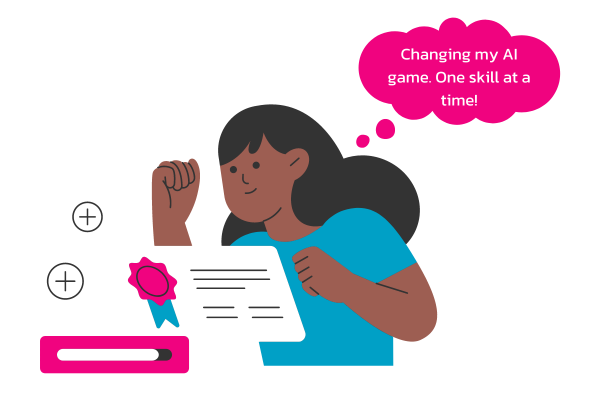
To effectively use AI in digital marketing, you need to brush up on certain technical skills.
Don’t worry, though—this isn’t about becoming a data scientist overnight. It’s about gaining a basic understanding of the tools and techniques that will help you leverage AI to its full potential.
Data Analysis:
At the heart of AI is data. Lots and lots of data. But here’s the thing—data is only as good as what you can do with it. That’s where data analysis comes in. By understanding how to analyze and interpret data, you’ll gain valuable insights that can guide your marketing decisions. Start with tools like Google Analytics and Excel. These platforms offer a solid foundation for learning how to track and measure data, identify trends, and make informed decisions that can drive your marketing success.
Machine Learning Basics:
You don’t need to be a coder to benefit from machine learning, but having a basic understanding of how it works can go a long way. Machine learning is what gives AI its ability to “learn” from data and improve over time. By familiarizing yourself with the basics, you’ll have a better grasp of what AI can and can’t do. Online courses from platforms like Coursera or Udemy are great resources to get started. Even a high-level understanding will help you leverage AI tools more effectively and confidently.
SEO and Content Creation:
AI is increasingly being used to optimize content for search engines and assist with content creation. That’s why having a solid understanding of SEO and content creation is crucial. Brush up on keyword research, on-page SEO, and content writing. The better you understand these areas, the more effectively you can use AI tools to enhance your content’s visibility and engagement. AI can suggest keywords, optimize meta descriptions, and even generate content ideas, but your expertise will guide these tools to achieve the best results.
Automation Tools:
AI thrives in automation, helping to streamline repetitive tasks and improve overall efficiency. Familiarize yourself with popular marketing automation platforms like HubSpot, Marketo, or Mailchimp. These tools often integrate AI to help you better manage email campaigns, social media posts, and lead generation. By understanding how to use these platforms, you can save time, reduce errors, and focus more on strategy and creativity. AI-driven automation is like having an extra pair of hands to keep your marketing machine running smoothly.
Investing time in developing these technical skills will not only make you more effective at integrating AI into your marketing strategy, but it will also make you more competitive in the ever-evolving digital landscape. As AI continues to grow in importance, marketers who can harness its power will be the ones leading the charge. So, take the plunge—these skills are your ticket to staying ahead in the game.
What Are the Pros and Cons of Using AI for Your Marketing Campaigns?
AI in marketing isn’t a magic bullet. While it offers numerous advantages, it’s important to be aware of the potential downsides as well. Let’s break it down:
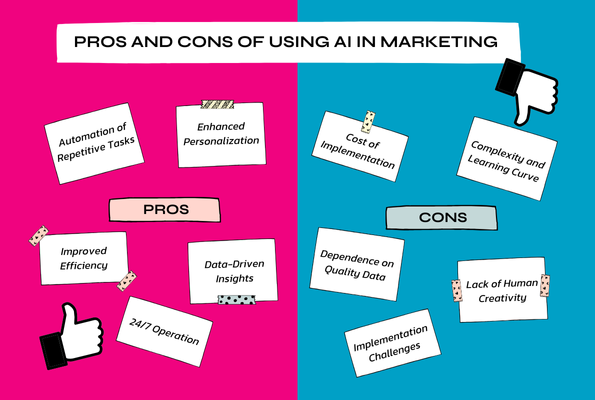
Pros:
Automation of Repetitive Tasks:
AI can take over time-consuming tasks you’d normally do as a digital marketer.
Imagine having a digital assistant that can handle time-consuming activities like data entry, scheduling social media posts, and managing email campaigns.
By delegating these tasks to AI, you can shift your focus to more strategic and creative aspects of your marketing efforts. This not only improves productivity but also allows you to concentrate on crafting innovative strategies and making high-level decisions that drive your business forward.
Enhanced Personalization:
Personalization is key to engaging your audience effectively.
AI analyzes a multitude of data points, such as user behavior, preferences, and past interactions, to tailor content specifically for each individual. For example, AI can recommend products based on previous purchases or adjust website content to reflect user interests. This level of personalization ensures that your audience receives relevant content that resonates with them, leading to increased engagement, higher conversion rates, and stronger customer relationships.
This means your audience gets exactly what they’re looking for, leading to better engagement and higher conversion rates.
Data-Driven Insights:
Data, in this age is a goldmine but making sense of it can be overwhelming.
I tools excel in processing and analyzing vast amounts of data to uncover valuable insights. They can identify trends, patterns, and anomalies that might not be immediately apparent. For instance, AI can analyze customer feedback to highlight areas for improvement or track campaign performance to optimize strategies in real time.
This helps marketers like yourself make more informed decisions and optimize campaigns in real-time.
Improved Efficiency:
One of the standout benefits of AI is its ability to enhance efficiency across various marketing operations.
By automating routine tasks and providing actionable insights, AI streamlines workflows and reduces the need for manual intervention. This leads to faster execution of marketing strategies and more accurate results.
For example, AI-powered tools can automate ad bidding, optimize email delivery times, and manage customer inquiries, all while maintaining a high level of accuracy. The result is a more efficient marketing operation that achieves better outcomes with less effort.
24/7 Operation:
Unlike humans, AI tools can work around the clock, ensuring your marketing efforts are always running smoothly and efficiently. They can operate continuously, providing round-the-clock support for your marketing activities. Whether it’s running automated email campaigns, monitoring social media interactions, or analyzing data, AI ensures that your marketing efforts are always in motion.
This constant availability means that your business can engage with customers and address issues even outside of regular business hours. The ability to maintain a continuous presence can significantly enhance customer satisfaction and keep your marketing strategies running smoothly at all times.
Cons:
Cost of Implementation:
High-quality AI tools and platforms often come with a hefty price tag.
For small businesses, startups or freelance digital marketers, these costs can be a substantial barrier to entry. The investment required not only includes the purchase of the AI software but also potentially involves ongoing subscription fees, maintenance, and updates.
You may need to carefully evaluate the return on investment and ensure that the benefits of AI outweigh the financial outlay.
Complexity and Learning Curve:
Digital marketers like yourself may find AI tools complex and difficult to master. These tools often come with a steep learning curve, requiring marketers to either undergo extensive training or hire specialists who are already proficient with the technology.
The complexity of AI tools can slow down the marketing team’s ability to leverage these tools effectively, impacting the overall efficiency and speed of campaign execution. You should prepared yourself to invest time and resources into learning and adapting to these new systems to fully benefit from it.
Dependence on Quality Data:
AI is only as good as the data it’s fed. If your data is incomplete, outdated, or just plain inaccurate, the insights and recommendations from AI tools can miss the mark.
Poor-quality data can lead to inaccurate insights and ineffective campaigns, making data management a critical aspect of AI implementation. This means you need robust data collection and management processes. Otherwise, you might find your AI-powered strategies falling flat, impacting your campaign results and overall marketing effectiveness.
Lack of Human Creativity:
While AI can automate and optimize many tasks, it’s been seen to lack the creativity, empathy, and intuition that human marketers bring to the table. For your marketing efforts to truly resonate with your audience, you’ll need to blend AI’s data-driven capabilities with your own creative and strategic thinking.
Implementation Challenges:
Integrating AI tools into existing systems can be complex and may require technical expertise or additional resources, potentially causing disruptions during the transition.
You might face technical hurdles or disruptions to your current workflows, which can slow down your campaign execution. Plus, setting up and maintaining these tools might require additional resources or expertise. As a marketer, being prepared for these challenges and having a solid plan for implementation can help you navigate these hurdles more smoothly.
How to Use AI in Digital Marketing
AI in digital marketing is more than just a buzzword; it’s a tool that can transform how you engage with your audience. From enhancing customer interactions to streamlining your campaigns, AI can transform how you connect with your audience. Here’s how you can start leveraging AI in your marketing efforts.
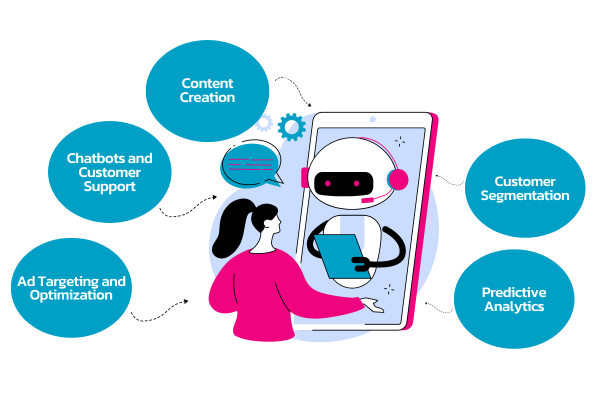
Content Creation:
AI can assist in generating content ideas, writing blog posts, or even creating personalized email campaigns.
Imagine having a virtual assistant that can churn out compelling blog posts, craft engaging social media content, or even design personalized email campaigns—all tailored to your audience’s preferences. Sounds amazing, right? That’s exactly what AI tools like Copy.ai and Jasper offer. These platforms use advanced algorithms to generate human-like text based on your input. Whether you’re brainstorming content ideas or need help drafting a post, AI can be your creative partner, saving you time and ensuring your content hits the mark.
Customer Segmentation:
Gone are the days of one-size-fits-all marketing. AI can analyze customer data to segment your audience based on behavior, preferences, and demographics. This means you can create highly targeted marketing campaigns that speak directly to the interests and needs of different customer groups. By delivering tailored content and offers, you can significantly boost engagement and conversion rates.
Predictive Analytics:
AI can predict customer behavior by analyzing past data. y sifting through historical data, AI can forecast future customer behavior and trends. This means you can anticipate what your customers might need next, fine-tune your marketing strategies, and enhance your customer retention efforts. Imagine knowing what content to produce or which products to promote before your audience even asks for them!
Chatbots and Customer Support:
You can use AI-powered chatbots to handle customer inquiries in real-time. These bots can handle a wide range of inquiries in real-time, providing instant responses and resolutions. This not only enhances customer satisfaction by reducing wait times but also frees up your support team to tackle more complex issues. With chatbots managing routine queries, your team can focus on delivering exceptional service and personalized support.
Ad Targeting and Optimization:
Running ad campaigns can be a bit of a gamble, but AI makes it a lot more strategic. By analyzing performance data, AI can optimize your ads in real-time, ensuring they reach the right audience at the right time. This means your advertising budget is spent more effectively, and your return on investment (ROI) improves. AI takes the guesswork out of ad targeting, helping you get the most bang for your buck.
Scaling Your Digital Marketing Efforts With AI
Once you’ve dipped your toes into the world of AI, there’s no going back. In fact, all you’re to do next is to scale up. There’s so much that AI has to offer in digital marketing and to explore it to the fullest, you have to have strategic approach and a willingness to experiment.
Integrate AI Across Channels:
To truly harness the power of AI, you need to integrate it across all your digital marketing channels—email, social media, content marketing, and paid advertising. Think of AI as a conductor of an orchestra, ensuring that each instrument plays in harmony. By applying AI across multiple platforms, you create a seamless and personalized customer experience.
For example, AI can help tailor your email content to individual preferences, optimize your social media ads in real-time, and provide insights into your content’s performance. This consistent approach not only enhances your customer’s journey but also boosts your overall marketing effectiveness.
Continual Learning and Adaptation:
The digital marketing landscape is constantly evolving, and so is AI technology.
Keep yourself informed about the latest AI trends and advancements. Subscribe to industry blogs, attend webinars, and participate in relevant forums. This proactive approach ensures that your AI strategies remain cutting-edge and effective. The more you learn, the better you can adapt your tactics to leverage new AI capabilities and stay competitive.
Collaborate with AI Experts:
If AI feels overwhelming, consider partnering with AI experts or consultants. They can help you set up the right tools, interpret data accurately, and optimize your marketing campaigns. They can also assist in setting up AI systems, interpreting data, and optimizing your campaigns. Partnering with experts not only eases the implementation process but also ensures you’re making the most of AI’s potential.
Measure and Optimize:
Scaling with AI is not a set-it-and-forget-it approach. Continuously monitor the performance of your AI-driven campaigns. Use the analytics provided by AI tools to track key metrics, assess your campaign’s success, and identify areas for improvement. Regularly reviewing these insights allows you to fine-tune your strategies, making data-driven adjustments that enhance your marketing outcomes. Remember, optimization is an ongoing process, and staying engaged with your data helps you stay ahead of the competition. Use analytics to measure success and identify areas for improvement. AI tools often come with built-in analytics that can provide you with actionable insights.
FAQs About AI in Digital Marketing
What exactly is AI in digital marketing?
AI in digital marketing refers to the use of artificial intelligence technologies to enhance and automate various marketing processes. This includes everything from analyzing consumer data to personalizing content and optimizing campaigns. Imagine having a super-smart assistant who knows what your customers want before they even tell you— that’s AI in action!
How can AI make my marketing campaigns better?
AI improves marketing campaigns by offering advanced data analysis, automating repetitive tasks, and personalizing user experiences. For instance, AI can analyze user behavior patterns to predict what content will resonate most with your audience. This means your marketing efforts are more targeted, efficient, and effective.
Are there any downsides to using AI for marketing?
AI in marketing offers many benefits, such as increased efficiency and the ability to handle vast amounts of data. However, it also has its drawbacks. For example, reliance on AI can lead to privacy concerns, and it may require significant investment. Balancing these pros and cons is key to leveraging AI effectively.
Is AI only for big companies, or can small businesses use it too?
Absolutely, small businesses can benefit from AI just as much as large corporations. AI tools have become more accessible and affordable, allowing small businesses to use them for tasks like customer service chatbots, personalized email marketing, and more. It’s all about finding the right tools that fit your budget and needs.
What are some popular AI tools for digital marketing?
There are several AI tools that can elevate your digital marketing game. For example, HubSpot uses AI to provide insights into customer behavior, while tools like Google’s AI-driven ad platform optimize ad placements. These tools help streamline tasks and offer valuable insights to enhance your marketing strategies.
I’m new to AI—where do I start?
Starting with AI in digital marketing can seem daunting, but it’s easier than you think. Begin by identifying areas where AI can add value to your existing processes, such as automating email marketing or improving customer segmentation. Then, explore user-friendly AI tools and platforms that offer tutorials and support to get you up to speed.



